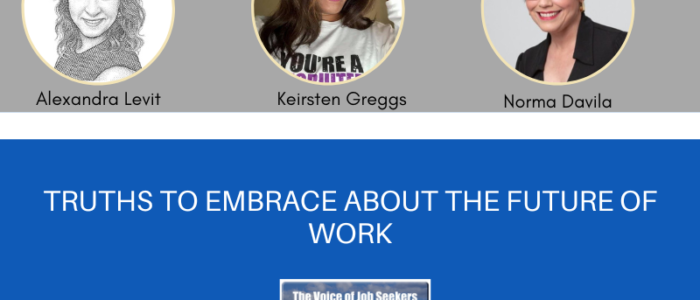We see and hear lousy advice daily, but if people want advice for immediate application, they are vulnerable to following anything partially anecdotal. Bad advice is often outdated advice. It worked, and then it stopped working. Like low-fat diets and Jane Fonda workouts, it worked for a few people at the time. Just as sure as mumble rap seemed cute at the time, it has the same effect as the old game telephone. Bit by bit, the main point gets misconstrued as it’s passed on from person to person, and the advice loses its essence and relevance. That’s why job seekers need to filter the advice they hear, vet it carefully, and customize it to their taste.
By the way, mumble rap never made sense to me, either.
Whether in one-on-one career coaching or reading a LinkedIn post, it must target your specific situation. If it doesn’t, but it makes sense, you can apply and modify it to your problem. At one time, copying and pasting the job description to your resume was a thing, and it worked. When I was traveling to Army bases in 2010-11, training and coaching federal workers’ current job skills, the Ctrl + C and Ctrl + V method was taught and encouraged to do it by people who should know better. It worked for many workers.
The copying and pasting methods weren’t working for most workers then or now. Thus, the training I and about two dozen others provided helped them modernize their job search skills. To the dismay of resume writers and career coaches worldwide, this advice is still given and works, but for very few. Maybe a few more people than the number of dinosaur pet owners.
Some advice that seems good at the time expires and becomes bad advice.
My last two articles mentioned how the after-effects of lousy advice could impair good career professionals or reputable advice because of the lack of data or information. One piece of advice could work well in one industry but may be detrimental in others. Years ago, I had a guest on the podcast who wrote resumes for a specific sector and said his clients benefitted from having photos on their resumes worked well. I wasn’t willing to argue with success, nor should anyone else.
The other thing I stressed was how broad sweeping advice to will on others turns bad and sometimes mislabeled because offered to the wrong audience. I’ve heard for years why everyone should learn to code, but it’s rare when someone breaks it down to why it applies to me. For the medical and computer fields, it’s very applicable, even if it’s for two different reasons. For every else, without context, it sounds great, but it doesn’t answer why.
Here are things to consider when you hear and want to implement this career advice:
- This advice is worth a try because others in my industry are using it and winning
- The guidance has supporting data and evidence showing why it works
- This advice plays to my strength and resonates with me
- I need to do something out of my comfort zone to get traction
- I see how I can modify it for me
What (possibly) is considered bad advice?
“Well, it depends…” is a frequently used response to a vague advice offering.
The list below has something for everyone, but I want to emphasize how some advice needs better context than one size fits everyone.
With context and understanding, it may fit one person but not the next. I know it applies to me as a career professional, too. General advice lands on the ground most of the time.
Let’s say advice givers and advice takers have work to do:
Advice: You’re too young, you’re too old.
Why it’s bad: The advice has irony for everyone. Those older were young once and thought and said these very words. People are breaking age barriers daily. There are the Mark Zuckerburg’s and Colonel Sanders’ waiting and “got next” worldwide. And there’s data to support arguments opposing either side.
The reframe: Always assume age is nothing but a number unless the job may have physical limitations to abilities. The worst thing to do is take age to keep you from building skills. Ageism is a thing, but learning there are no boundaries. You will need to modify how you present and market yourself in most cases and not avoid it because someone says there’s a boogie man in the bushes.
Advice: You should have X amount of jobs on your resume.
Why it’s bad: Content and audience are everything regarding your resume. People find it challenging because it requires thinking, research, and knowing their industry.
The reframe: If you don’t write to target a job, company, or industry, you will miss everything. Many people benefit from writing their resumes for each position, while others benefit from understanding the industry and the problems they solve.
Advice: Follow your dreams, passions, heart, and fantasies.
Why it’s bad: It’s inspiring to get people’s attention, but it’s intellectual insulin. It’s empty calories in the process of being bloated and nothing more. Follow dreams or “follow” anything advice has inspired millions and sounds good at the time, but lacks substance.
The reframe: It works if practical steps follow it, then it works. By itself, it’s a slogan.
Advice: New graduates, don’t negotiate your salary! Just work hard, and you’ll get noticed.
Why it’s bad: Young graduates are normalizing innovative tactics without the burden of asking for more money. Gen Z is making it work for them in the long game by asking for mentorship, more PTO (Personal Time Off), and paid Professional development.
The reframe: There are many parts of a compensation package to create a more attractive competitive offer. Remote or hybrid work days, flexible schedules, gym memberships, and stock options are possibilities to create an equitable and tangible package. Oh yeah, more cash still works, depending on the industry.
Advice: Don’t do your old job.
Why it’s bad: My take is different on this philosophy for two reasons, 1) Your old job skills often help set an example for those you may manage who currently do your old job, and 2) Your old job may be a transition job as separations of all kinds happens.
The reframe: Leverage the good and transferable skills from your old job. My ability to “diffuse bombs before they blow up” was my calling card as a call center manager. In my experience, middle and upper management personnel with excellent people skills fielded complaints mild and hostile with ease.
I barely touched the surface of the broad but unuseful advice we often hear. I would love to hear what advice is terrible to you, why, and how it would work once you reframe it. You should also reframe the advice given out of fear of just avoiding something because there is an unknown factor. Use the same strategy to reframe advice from fear and understand why it wouldn’t apply to you.
Here are others to rework in your mind and reframe:
“Do something you love and never work a day in your life.”
Never quit.
You can do anything you want if you want it bad enough.
Fake it til you make it.
About Mark Anthony Dyson
I am the "The Voice of Job Seekers!" I offer compassionate career and job search advice as I hack and re-imagine the job search process. You need to be "the prescription to an employer's job description." You must be solution-oriented and work in positions in companies where you are the remedy. Your job search must be a lifestyle, and your career must be in front of you constantly. You can no longer shed your aspirations at the change seasons. There are strengths you have that need constant use and development. Be sure you sign up to download my E-Book, "421 Modern Job Search Tips 2021!" You can find my career advice and work in media outlets such as Forbes, Inc., Fast Company, Harvard Business Review, Glassdoor, and many other outlets.

